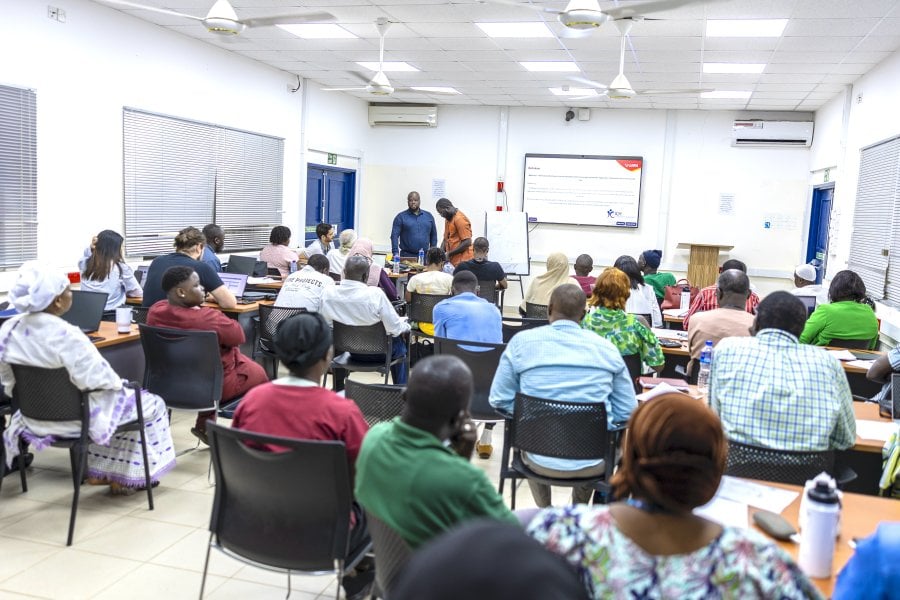
Group of individuals in a meeting room at MRCG
On Wednesday, October 23rd, 2024, Medical Research Council Unit The Gambia at the London School of Hygiene and Tropical Medicine (MRCG at LSHTM) convened the TB Sequel N-acetyl cysteine (NAC) clinical trial site initiation visit (SIV) meeting.
The NAC trial is a part of the TB sequel seeking to better understand whether NAC treatment can prevent or improve lung damage in TB patients in addition to TB therapy.
The three-day SIV meeting with 60 stakeholders, including partners from the Gambia National Leprosy and Tuberculosis Control Programme (NLTBCP) at the Ministry of Health, was organised in partnership with TB Sequel, Ludwig Maximilian University of Munich and The Aurum Institute and supported by the German Ministry of Education and Research (BMBF).
Professor Robert Wallis, the Principal Investigator for the trial from The Aurum Institute underscored that “TB is one of the most common infectious diseases globally and we are delighted to be able to collaborate with MRCG on this trial.”
“We hope that this trial will confirm the findings of our first study, a nutritional supplement to help prevent oxidative damage to the lung during TB, and promote the recovery of the lung post-TB, particularly in the patients with the greatest lung impairment at the time of TB diagnosis,” he added.
Marie Gomez, Programme Manager for the Gambia National Leprosy and Tuberculosis Control Programme (NLTCP), Ministry of Health said that “the NLTCP offers critical insights into the local disease burden, patient demographics, and operational challenges. It’s strong networks with healthcare workers and direct access to vulnerable populations will ensure efficient recruitment, follow-up, and monitoring throughout the study,” she added.
According to Andrea Rachow, the Co-Principal Investigator for the trial from the Ludwig Maximilian University of Munich, the meeting is invaluable in setting the pace for the trial, which will shed light on the underlying pathways that lead to post-TB lung disease (PTLD).
“While the clinical outcome measures in the trial will help us understand whether NAC treatment can prevent or improve lung damage in TB patients, the extensive immunological analyses associated with the trial, which will be carried out at the MRCG in collaboration with partners at the Borstel Research Centre and Ludwig Maximilian University of Munich, will significantly improve our understanding of the pathways leading to lung damage. This will also pave the way for future biomarkers and treatment development in PTLD,” he concluded.
Dr Behzad Nadjm, Principal Investigator for The Gambia site at MRCG highlighted, “We hope that the experience of participating in the NAC-PTLD Trial will further develop clinical trials capacity in the TB team, thereby bringing further interventional studies in the future. It will also enrich our ongoing research into post-TB lung disease, an area where we are already leading the way through the innovative TB Sequel project.”
“MRCG also seeks to develop laboratory capacity through new methods for analysis and techniques incorporated into the trial. All this can only be good news for the people of The Gambia.” he concluded.
The meeting is aimed at enhancing participants' understanding of the trial's objectives. This collaboration marks a significant step forward in the global fight against TB and to improve post-TB recovery outcomes.
The study is expected to recruit participants across three African countries: The Gambia, Tanzania, and Mozambique.
If you enjoyed this article and would like to build a career in global health, we offer a range of MSc programmes covering health and data, infectious and tropical diseases, population health, and public health and policy.
Available on campus or online, including flexible study that works around your work and home life, be part of a global community at the UK's no.1 public health university.
